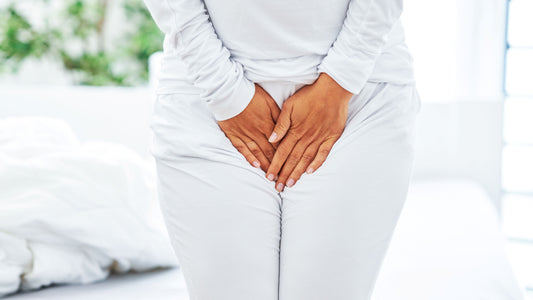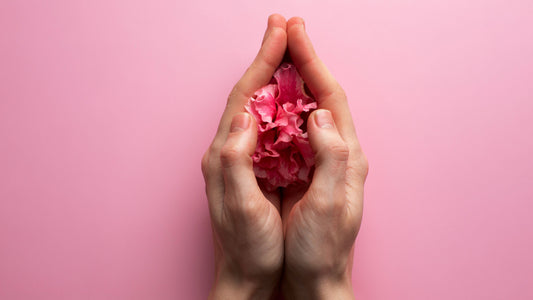When was the last time you had a conversation with someone, not just about sex, but about your sexual health?
Maybe you find it’s easy to talk about it, but in my practice I’ve found that many women are a bit embarrassed to go into too much detail! And women who aren’t in a relationship aren’t even sure there’s anything to talk about!
Well sexual health doesn’t only refer to the times in your life when you have a partner. Just like your mental, physical, and emotional health, it’s with you for your entire life! And all four different types of health are interrelated with each other, so your sexual health affects the other three, and they also affect your sexual health. Together they make up you, as a whole person. That’s why it’s so important to talk about it.
What is sexual health?
Let’s first begin with a definition. The World Health Organization defines sexual health as, “a state of physical, emotional, mental and social well-being in relation to sexuality; it is not merely the absence of disease, dysfunction or infirmity. Sexual health requires a positive and respectful approach to sexuality and sexual relationships, as well as the possibility of having pleasurable and safe sexual experiences, free of coercion, discrimination and violence. For sexual health to be attained and maintained, the sexual rights of all persons must be respected, protected and fulfilled.”
Today we’ll talk about the first part of that definition. Whether or not you have a sexual partner everyone deserves to have a positive and respectful approach to their sexual health.
“What if I don’t have a partner?”
There are many reasons women may not be sexually active. It may be out of sadness as a result of having lost a partner who has passed, or ending a relationship.
It may be a result of a health issue that makes having a sexually intimate relationship more challenging.
And it may be a personal choice or simply finding fulfillment in a variety of interests such as traveling, engaging in exciting hobbies, and spending time with extended family.
“What if my partner and I don’t have much of a sex life?”
In addition, there are many couples who have little or no sex, sometimes through choice, but more often through external factors. It’s usually because of stress coming from work, kids, and personal responsibilities. It’s because of busy lives leaving both men and women exhausted. It feels like there isn’t either time or energy for healthy intimacy. This is a separate, but important problem to address. (See these other articles for some thoughts about that: A Time for Everything; and 3 Tips to Bring Passion Back into a Sexless Marriage.)
As you can see from the definition above though, sexual health applies to everyone, not just to those who are sexually active. So let’s talk about your sexual health, whether or not you’re having sex.
Sexual health starts with a healthy V!
As you know, either because you’ve read my articles before or because you’ve experienced it yourself, as you age your vagina and vulva also change. (If you don’t know where your vulva is, please watch this short video!)
What happens as they change? Because of your hormone changes (see here for more on that), your vagina gets thinner and less elastic. It also produces less lubrication, making it dry. Your vagina and clitoris can shrink, your labia become less full, and may even change color. All of these changes can lead to vaginal atrophy.
Vaginal atrophy - the symptoms I just described - occurs primarily because your body produces less estrogen as you go into and through menopause.
This can cause painful intercourse and even uncomfortable and embarrassing urinary problems.
Extra risk factors include: smoking, never having had a vaginal birth, and no sexual activity. Yes, lack of sex contributes to MORE vaginal dryness! Problems with vaginal dryness include:
- Urinary tract infections
- Uncomfortable or even painful sex
- Decreased desire for sex
- Incontinence and/or urgency problems
- Discomfort wiping after going to the bathroom
- Uncomfortable or even painful activities like biking, riding horses or even walking
So what can you do to improve your sexual health?
First, avoid chemicals and irritants that go near your “lady bits”! This can include bubble bath, certain types of soap, certain over-the-counter lubricants. Check the labels for everything that goes near your sensitive zone - near your V - and make sure it is healthy and soothing, not irritating. This article gives a comparison of different creams and lubricants so you know which to use when.
Second, keep your “lady bits” active! Since sexual activity increases blood flow to your vagina - which keep vaginal tissues healthy - regular sex and vulvovaginal massage (without a partner) will actually reduce vaginal dryness.
Third, you can actively improve your pelvic floor muscles with Kegel exercises. If you don’t want to be one of the elderly women who ends up in a nursing home primarily because of incontinence issues, I am sure you’ll love this next part! It’s so easy to do and has such long-lasting, powerful benefits!
But many women don’t do Kegel exercises correctly, meaning they don’t actually benefit from the exercises they do. No! Let me help you! Please check out this 4-minute video to discover:
- How to do pelvic/Kegel exercises correctly
- How to test if you are doing them properly and…
- How often to do these exercises for the best results.
Finally, after having seen thousands of women in my office, many of whom struggle with the same issues, I developed this incredibly popular and effective treatment called Julva.

Julva is a vaginal cream that uses only natural ingredients such as vitamin E, coconut oil, emu oil, shea butter and DHEA, a natural hormone. DHEA is produced by your body’s adrenal glands and is a precursor to male and female sex hormones like testosterone and estrogen. Precursors are substances that are converted by your body into a hormone. DHEA, then, can increase the levels of these sex hormones which your body needs for full sexual health.
Applied topically DHEA is a highly effective treatment option for the kinds of vaginal atrophy and menopause symptoms we’ve been discussing.
Let’s sum it up!
The truth is, if you do nothing, you’re much more likely to suffer from one or more of a host of symptoms that are unnecessary! That’s why I encourage all my patients and readers to get excited about the fact that you can actually take charge of your sexual health! When you do it will result in an emotionally richer, happier life, with less stress and more satisfying intimate relationships. Now who doesn't want that?
- Be careful about what you put near your V; read labels carefully
- Exercise! Sexual activity or massage, and kegels are the best way to strengthen those muscles, improve blood flow, and reduce dryness
- Use topical Julva to stop embarrassing urine leaks, reignite intimacy, and stop vaginal dryness and discomfort. Click here to find out more!
I love that you’re interested in taking care of yourself! Whether or not you have a sexual partner, don’t let a little shyness about a private topic prevent you from asking the questions that will help you manage and vastly improve whatever symptoms you’re struggling with right now.
You deserve to know how to take care of your body because that influences every other aspect of your life. Sexual, mental, emotional, and physical health are interdependent. Take care of your V, and the other parts of your life will seem a lot better too.
CLICK HERE FOR JULVA®.




